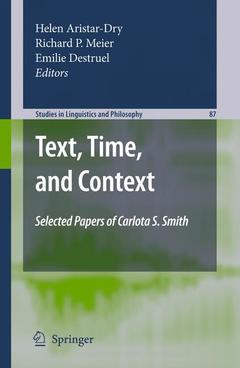Description
Text, Time, and Context, 2010
Selected Papers of Carlota S. Smith
Studies in Linguistics and Philosophy Series, Vol. 87
Coordinators: Meier Richard P., Aristar-Dry Helen, Destruel Emilie
Language: English
Subject for Text, Time, and Context:
404 p. · 15.5x23.5 cm · Hardback
Description
/li>Contents
/li>Biography
/li>Comment
/li>
Carlota S. Smith was a key figure in linguistic research and a pioneering woman in generative linguistics. This selection of papers focuses on the research into tense, aspect, and discourse that Smith completed while Professor of Linguistics at the University of Texas at Austin.
Smith?s early work in English syntax is still cited today, and her early career also yielded key research on language acquisition by young children. Starting in the mid-1970s, after her move to UT, she embarked on her most important line of research. In numerous papers - the first of which was published in 1975 - and in a very important 1991 book (The Parameter of Aspect), Smith analyzed how languages encode time and how they encode the ways events and situations occur over time.
Smith?s work on the expression of time in language is notable because of its careful analyses of a number of quite different languages, including not only English and French, but also Russian, Mandarin, and Navajo. Inspired by a year in France in the early 1970s, Smith began to analyze the differing ways in which languages encode time and how they encode the ways events and situations occur over time. In doing so, she developed her signature ?two-component? theory of aspect. This model of temporal aspect provided an excellent framework for graduate students seeking to analyze the temporal systems of an array of languages, including under-described languages that are so much the focus of research in UT?s Linguistics Department.
Selected by Carlota Smith herself and by her longtime friends and colleagues, this book contains her 1980 piece on temporal structures in discourse, her 1986 comparison of the English and French aspectual systems, a 1996 paper on the aspect system in Navajo (an increasingly-endangered language which Smith worked to preserve), and her 1980 and 1993 papers on the child?s acquisition of tense and aspect.
Smith, who died in 2007, was a trailblazer inher field whose broad interests fed into her scholarly research. She was an avid reader who sought to bring the analytic tools of linguistics to the humanistic study of literature, by examining the syntactic and pragmatic principles which underlie literary effects. Her research on rhetorical and temporal effects in context was integrated into her last book, Modes of Discourse (2003).
The current volume of articles covers much of her most fruitful work on the way in which language is used to express time, and will be essential reading for many working and studying in linguistics generally and in semantics particularly.
Professor Carlota S. Smith of the Department of Linguistics at The University of Texas at Austin died Thursday, May 24 at the age of 73 after a long battle with cancer. She was the Dallas TACA Centennial Professor in the Humanities and taught at The University of Texas at Austin for 38 years.
Carlota Smith received her bachelor's degree from Radcliffe College in 1955. In the late 1950s, she became a research assistant and then a doctoral student in the Department of Linguistics at the University of Pennsylvania. During this time she worked with Zellig Harris, who directed the doctoral dissertation of Noam Chomsky and who would also later direct her own doctoral dissertation. In 1961, Prof. Smith was a graduate student at the Massachusetts Institute of Technology in Cambridge, MA, where she was one of the very first woman students to work with Chomsky. Prof. Smith's first publication (`A Class of Complex Modifiers in English', 1961) dates from this period. It appeared in the journal Language.
After receiving her M.A. (1964) and Ph.D. (1967) at the University of Pennsylvania, Prof. Smith joined the faculty of The University of Texas at Austin in 1969, where she was a faculty member in the Department of Linguistics until her death. She served as the chair of the department from 1981-1985. In 1991, she was named the Dallas TACA Centennial Professor in the Humanities.
Prof. Smith's early research examined the syntax of English. In 1969, she published, along with Elizabeth Shipley and Lila Gleitman, a very influential paper on how children acquire English as a first language; in ensuing years she would publish several more papers on child language development. Starting in the mid-1970s, she embarked on what was perhaps her most important line of research. In many papers and in a very important book (The Parameter of Aspect, published in 1991 by Kluwer), she analyzed the ways in which languages encode time andhow the
These books may interest you

Time in Language 64.97 €



